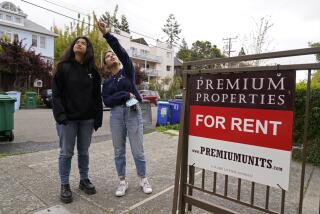As Bubbles Pop, the Splatter May Hit Your Home
You agree that your house is worth too much, don’t you? In the last week, the Wall Street Journal and the Financial Times used the word “bubble” in headlines concerning housing prices. Real estate prices have bubbled so much in recent years that these two business-minded newspapers, rarely accused of sensationalism, now find the term routine.
But what about ordinary Americans, 68% of whom own their own homes, and for most of whom their house is their biggest asset? In the last few years, the value of folks’ stock portfolios has bubbled up and then popped. So should people be listening for a similar giant popping sound in regard to home values? If top financial players--who usually get out of the market first, taking the most out with them--are a guide, then maybe it’s time to give the ominous data a hearing.
To be sure, the early warning signs of bubblefication are uneven. Home prices continue to rise nationally, up 7.4% in June 2002 from June 2001, according to the National Assn. of Realtors; yet this year, sales of existing homes dropped 11.7% from May to June, and June’s sales activity was 4.3% below the sales rate of a year before. In Los Angeles, sales dipped because fewer homes were on the market. But elsewhere, prices rose even as demand fell. Illogical? Sure it is, and illogic is one of the warning signs of a bubble.
Of course, the housing market is a lot less liquid than stocks. One can’t log on to E-Trade, buy or sell a house at the click of a mouse and then be in or out the next minute. But even so, housing has displayed a champagne-like fizz lately, at a time when other investments have fallen flat. Residential housing prices surged over the last five years from a median price of $121,800 in 1997 to $163,500 in June 2002. That’s an upside of 34%--not bad if you can keep it.
And that’s the question: At a time when other values are down, can home prices stay up? After all, during those same five years the stock market has given back all its bubble-icious gains, and then some. The Standard & Poor’s 500 index, for example, closed at 834 Monday, well below where it was five years ago today, when it closed at 952.
The housing industry dismisses talk of a bubble. Interest rates are down, they say. Yes, the current national average mortgage rate is about 6.65%, the lowest in at least three decades. But how low can it go? And how long can it stay down? That’s mostly a matter for Federal Reserve Board Chairman Alan Greenspan to determine.
He will probably cut rates in the near term--further puffing up prices and also second mortgages, as recession-battered Americans pull out cash to meet expenses--but eventually what comes down must go up.
Higher rates might be the right policy for the country over the next few years, but try explaining that to an over-leveraged, sell-crazed homeowner. So expect a major political fight over home equity preservation.
Meanwhile, data points--the bubble-pricking kind--keep spiking. Ian Morris, an economist at HSBC Securities, argued earlier this year that the ratio of personal income--about $7.4 trillion--to the total value of individually owned residential real estate--about $12 trillion--was becoming unsustainable. That ratio, 1 to 1.6, is about 25% higher than the historical average, he observed, leaving real estate nowhere to go but down. The last time the ratio reached so high was in 1989, just before the price pop of the early 1990s.
In April, a Goldman Sachs research report analyzed the residential construction industry, from home builders to home suppliers. “The two-year streak of outperformance could be coming to an end,” it concluded. Indeed, in the four months since, prices for the industry group are down. Of course, the overall market also is down.
But that’s the bottom line: Housing runs on its own cycle, but it can’t be disconnected from the larger economy. If the economy double-dips into another recession, homeowners too will take a bath. And the remains of the bubble will not keep them afloat.
*
James P. Pinkerton writes a column for Newsday in New York. E-mail: [email protected].
More to Read
Inside the business of entertainment
The Wide Shot brings you news, analysis and insights on everything from streaming wars to production — and what it all means for the future.
You may occasionally receive promotional content from the Los Angeles Times.










